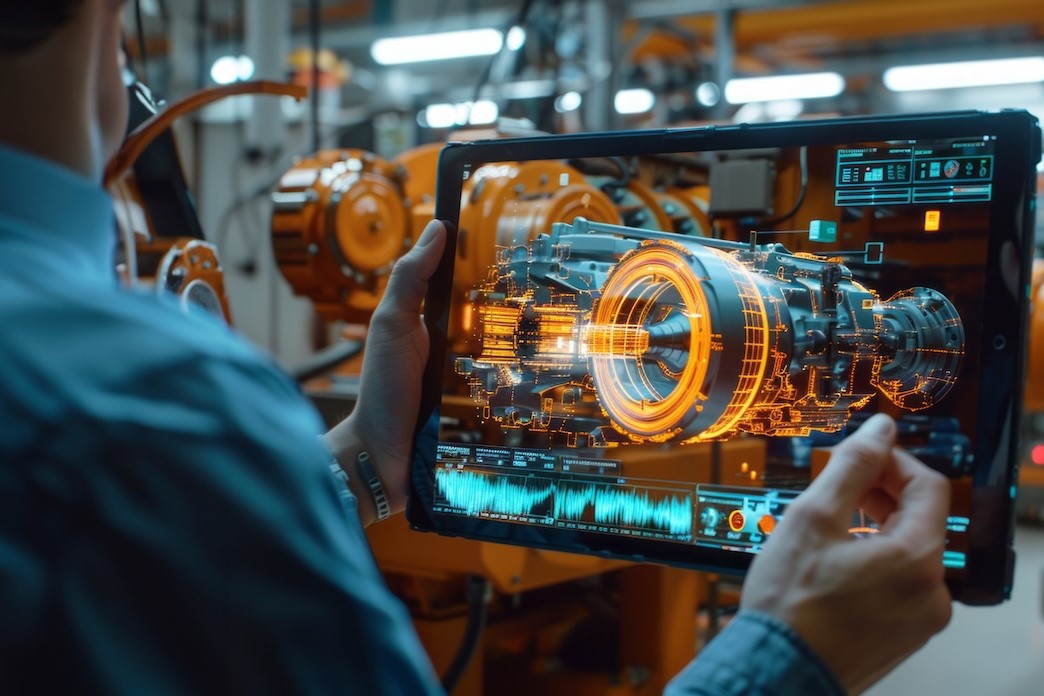Artificial intelligence is the most widely discussed and central topic in the field of innovation and digital transformation in recent years, so pervasive that it is impossible not to mention it even in sectors where its use is already established. It is, therefore, a matter of better understanding a phenomenon that has jumped into the headlines recently, but whose origins go back further. Artificial intelligence in manufacturing has, in fact, reached a mature level of adoption: why, then, is it being talked about again?
Artificial intelligence in manufacturing: let’s get some clarity
The misunderstanding stems from the not entirely appropriate use of terminology. Today, in fact, there is a tendency to use the term “Artificial Intelligence” to refer to a more specific field of application, namely Generative Artificial Intelligence or Gen AI.
Actually, “Artificial Intelligence” should be an umbrella term that also includes other application areas such as machine learning, deep learning, machine vision, and so on.

From this perspective, the marriage of AI and manufacturing goes back at least to the definition of Industry 4.0¹ in the early 2010s, which identified this very combination as one of the founding principles. In this context, we refer primarily to uses related to data analysis and process optimization. The use of artificial intelligence in business processes in industry is, therefore, well-established and in many cases transparent to end users and operators.
There is, of course, no shortage of innovations and improvements, but the peak phase of innovation has given way to proven, established applications in which a pragmatic approach prevails. We recall the main ones below.
On the other hand, Gen AI is also gaining ground in industry and manufacturing. Again, a limitation of commonly used definitions must be considered: the best-known conversational models do not represent the full potential of generative models. In this sense, innovative and particularly interesting uses of generative AI are emerging .
Artificial intelligence in manufacturing: established application technologies
As we have mentioned, the use of artificial intelligence in manufacturing and industry already has numerous universally available application fields. We recall here the main ones.
Collaborative robotics
Cobots support operators in performing complex or burdensome tasks. They are machines that, thanks to artificial intelligence, can learn, adapt and work safely alongside humans, improving efficiency and safety.
Predictive maintenance
Advanced data analysis enables the prediction of failures and anomalies and reduces the cost of planned maintenance. Predictive maintainance makes better use of resources allocated to maintenance and improves overall plant safety.
Digital Twin
Digital twins virtually replicate machinery and plants to perform simulations and optimizations without physical intervention. AI enables in-depth analytics that empower every aspect of business management, from predictive maintenance to operations management.
Quality control
Tools such as AI-based computer vision detect defects and anomalies with greater accuracy than the human eye. This makes it possible to prevent production errors, increase product quality and support operators.
Demand forecasting
Machine learning algorithms analyze historical data to predict market trends. This capability improves production planning and optimizes the supply chain through the elimination of bottlenecks and inefficiencies.
Logistics and inventory
AI optimizes both procurement aspects by being able to predict specific needs and manage inventories dynamically. In this way, companies can avoid disruptions in production or problems with stocks or supplies.
The potential of Gen AI in manufacturing
In contrast, generative artificial intelligence is now beginning to make its way into the manufacturing context, with applications that can have considerable impacts, at different points in the supply chain. An interesting insight from McKinsey² summarizes them comprehensively. We reproduce here an excerpt of those that are particularly significant, beyond such well-known topics as analytics, where the potential is already widely known and expressed, document management, and enterprise knowledge organization, also fields widely discussed elsewhere.
- Create product concepts accompanied by technical drawings and documentation to reduce research and development time for prototypes, even in a highly serialized manner.
- Discover new materials through tests and simulations to define their potential and possible limitations as alternative raw materials.
- Develop production plans based on supplies, equipment, and resources also available on a contingent basis.
- Procurement: discovering new possible suppliers from unfamiliar or unfrequented sources.
- Identify hazardous working conditions or activities and promptly inform the key functions involved in deploying solutions and countermeasures.
- Automate route definition so as to optimize cost, mileage, and delivery time efficiently and dynamically.
As we can see, these are highly innovative activities that take advantage of the specifics ofgenerative artificial intelligence and place it within the production context.
Innovation or revolution? A shifting horizon
Defining whether the impact of Artificial Intelligence in manufacturing in 2025 is revolutionary or groundbreaking requires much attention. While it is true that the industrial environment has come to the era of widespread AI well prepared thanks to the innovations taking place since the origins of Industry 4.0, it is also true that the renewed focus, especially on generative AI, is creating a strong buzz in the emergence of new solutions and ideas. One thing is for certain: for companies that are approaching the topic, it is important to do it the right way, with the understanding that this is an area where many interesting innovations will take place in the coming years.
Do you want to integrate AI into your business? We can help you.
Our group includes Regesta LAB, the specialized company that has been applying artificial intelligence solutions in manufacturing and other sectors for years, supporting companies in adopting the technologies best suited to their needs.
Contact us to find out how AI can optimize your processes and bring value to your business.
Source ¹: SAP Italy website
Source ²: McKinsey website